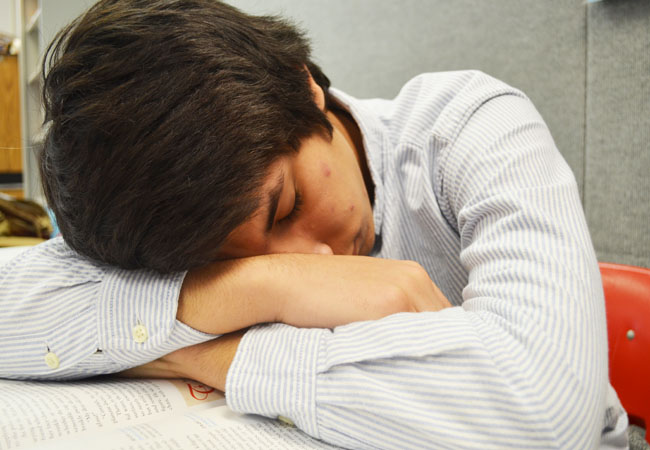Concerned members of the FCPS community met in the auditorium to hold a SLEEP conference to discuss possible changes in school starting times. The SLEEP (Start Later for Excellence in Education Proposal) organization aims to get FCPS schools to start after 8 a.m. to eliminate the the detrimental effects of chronic sleep deprivation in teens.
The SLEEP conference held at AHS on Feb. 26 discussed the many consequences of teenagers getting insufficient sleep. Around 60 supporters and various community leaders were present at the meeting in the hopes to delay school start times to fix the many health and educational problems associated with sleep deprivation and to improve learning conditions for teens.
The meeting lasted from 7-9:30 p.m., and the seven speakers all spoke in support of the initiative. The speakers ranged from health specialists to teachers in counties where the starting times had been delayed from 7 a.m. to 8 a.m. and have only seen positive ramifications.
Most teenagers are accustomed to crawling into bed late at night, waking up after only a few hours of sleep and spending the rest of their day in a haze. After school, club meetings, sport team practices and homework, the cycle repeats.
This is what SLEEP is hoping to correct. Teenagers, on average, need about nine hours of sleep every night, however, the average high school student gets less than seven hours.
“The reality is, and this data is now several years old from the National Sleep Foundation’s Sleep of America polls, I think it’s worse now, 80% of adolescents get less than that nine hours of sleep,” Judith Owens, a medical specialist who spoke at the SLEEP conference, said. “On a practical level, the average adolescent is best suited to fall asleep at around 11 o’clock at night…to get up at eight o’clock in the morning in order to get adequate sleep.”
These poor sleep patterns have serious consequences for teenagers. A common side effect of sleep deprivation in students is low concentration in class, and lower grades as a result.
Many may not realize that a lack of sleep also creates health problems for teens. Insufficient sleep in adolescents was identified as a “public health crisis” by the American Medical Association in 2010.
“The younger you are, the higher risk you have of becoming overweight or obese in relationship to insufficient sleep,” Owens said.
Sleep deprivation can cause obesity. Sleep deprived teens are more likely to feel hungrier, eat more food, eat food with more calories and eat more carbohydrates. Studies also show that people are more likely to lack enough energy to exercise. One sleep poll concluded that almost a third of teenagers reported being too tired to exercise. Yet, because a lack of sleep can alter your mood and judgement, people can be less likely to stick to their diet.
There can also be an increase in risk for type-2 diabetes, “not just as a result of obesity, but as a result of sleep deprivation itself,” Owens said.
Lastly, another health risk is caused by the staple source of energy in many’s mornings: caffeine.
“There is evidence to suggest that caffeine may function as a gateway drug, that the earlier you start caffeine use and the heavier your use is, the more likely you are to smoke cigarettes and to use other drug and stimulus,” Owens said.
Sleep deprivation can even cause fatalities on the road. Many fatal crashes are caused by drowsy driving. Teenagers, while already young and inexperienced drivers, put themselves at an even greater risk by getting behind the wheel without enough sleep.
This year, 6 school board members support the SLEEP initiative and many members of the SLEEP organization are hopeful that the increase in support will initiate the change.
Many parents support SLEEP because they have watched their children experience the effects of sleep deprivation.
Laurie Lindberg, an AHS parent, has supported SLEEP since 2005. Her devotion to the cause is “because I have witnessed my own children make the transition from childhood to adolescence with a handicap, the handicap being sleep deprivation,” Lindberg said.
Dr. Heleme Emsellem, the medical director of the Center for Sleep and Wake Disorders and author of the book Snooze or Lose, was one of several members on the SLEEP conference panel, and shared her experience with the negative effects of early school start times.
“It became clear to me that there was a real disconnect between what my kids were being asked to do in terms of their timing of their lives and what was going on biologically with them,” Emsellem said.
She also sees “an enormous number of adolescent patients…coping with this and their parents coping with the problem,” Emsellem said.
“Everything in one’s life is enhanced and of higher quality and safer when one is well-rested,” Lindberg said.
















